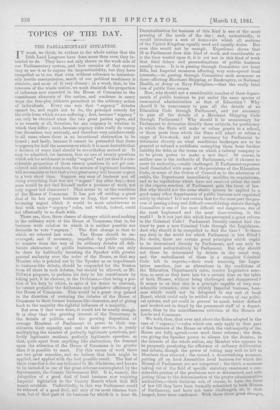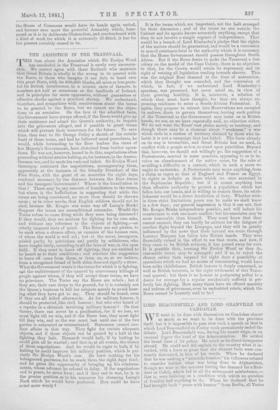TOPICS OF THE DAY.
THE PARLIAMENTARY SITUATION.
fT must, we think, he evident to the whole nation that the 1 Irish Land Leaguers have done more than even they in- tended to do. They have not only shown us the weak side of our Parliamentary system, and how enemies of that system may so use it as to expose its impracticability, but they have compelled us to see that even without reference to intention- ally hostile manipulation, much of our political machinery is obsolete, and most of it very clumsy ; in a word, that, in the interests of the whole nation, we must diminish the proportion of influence now conceded in the House of Commons to the constituent elements of the nation, and condense in many ways the free-play hitherto permitted to the arbitrary action of individuals. Every one sees that " urgency" debates cannot be, and ought not to be, the principal remedy for the evils from which we are suffering ; first, because "urgency " can only be obtained when the two great parties agree, and is no remedy at all, therefore, for any exigency in relation to which they differ ; next, because urgency rules really do cramp free discussion very seriously, and therefore very mischievously in all cases where there is no intentional obstruction to be feared ; and lastly, because it cannot be pretended that there is urgency for half the measures on which it is most desirable that a decision of some kind should be nevertheless arrived at. It may be admitted, for instance, that no one of twenty questions which ask for settlement is really "urgent," and yet that if a con- siderable proportion of these twenty questions do not get con- sidered and settled somehow, the arrears of legitimate business will accumulate so fast that every great many will become urgent in a very short time. Suppose any man of business put off doing everything that was not " urgent " day after day,—how soon would he not find himself under a pressure of work, not only urgent but clamorous ? That seems to us the condition of the House of Commons. It has put off settling a great deal of its loss urgent business so long, that measures are becoming urgent which it would be most mischievous to deal with under " urgency" rules, and which, indeed, could not effectually be so dealt with.
There are, then, three classes of changes which need making in the ordinary work of the House of Commons, that is, for business with relation to which it is neither possible nor desirable to vote "urgency." The first change is that to which we referred last week, The House should be en- couraged, and if necessary, impelled by public opinion, to remove from the way of its ordinary debates all deli-. berate obstructore of public business,—and this can only be done by habitually investing the Speaker with greater general authority over the order of the House, so that any Member who is pointed out by the Speaker as an impediment to business-like debate, should be suspended for the Session from all share in such debates, but should be allowed, as Mr. Dillwyn proposes, to perform his duty to his constituents by taking part, if he chooses, in the Divisions,—that being a por- tion of his duty by which, in spite of his desire to obstruct, he cannot prejudice the deliberate and legislative efficiency of the House of Commons. This would be a great step gained in the direction of restoring the debates of the House of Commons to their former business-like character, and of giving back to the majority the rightful influence of a majority.
But even if that were done, it would not be nearly enough. It is clear that the growing interest of the Democracy in the details of politics, and the growing disposition of average Members of Parliament to prove to their con- stituents their capacity and zeal in their service, is yearly multiplying the number of perfectly legitimate questions, per- fectly legitimate motions, perfectly legitimate speeches, so that, quite apart from anything like obstruction, the demand upon the attention of the House of Commons is far greater than it is possible to meet. For this excess of work there are two great remedies, and we believe that both might be applied, and applied with the best possible result. The first of these remedies is the one indicated by Mr. Gladstone, and known to be included in one of the great reforms contemplated by the Gevernment, the County Government Bill. It is, namely, the delegation of a good deal of local business now requiring Imperial legislation to the County Boards which that Bill would establish. Undoubtedly, in this way Parliament would be relieved of a good deal, not only of its most irksome busi- ness, but of that part of its business for which it is least fit.
Decentralisation for business of this kind is one of the most. pressing of the needs of the day ; and, undoubtedly, it .would introduce a sort of home-rule which all sections of the United Kingdom equally need and equally desire. But. even this would not be enough. Experience shows that. ill as Parliament does this kind of work, and considerable as' is the time wasted upon it, it is yet not in this kind of work that fatal delays and procrastinations of public business usually occur. It is in passing through Committee not local Bills, but Imperial measures affecting very wide-spread local interests,—in passing through Committee such measures as those affecting Merchant Shipping, or Bankruptcy, or National Health, or Army or Navy Discipline,—that the really fatal loss of public time occurs.
Now, why should not a considerable number of these depart- ments of public business be put under the same species of economical administration as that of Education ? Why • should it be unnecessary to pass all the details of air Education Code through Parliament, and yet necessary. to pass all the details of a Merchant Shipping Code through Parliament ? Why should it be unnecessary for Parliament to determine directly those subjects, for proficiency-- in which the State will make or refuse grants to a school, or those ports from which the State will admit or refuse a cargo of live-stock, and yet necessary for Parliament to' determine directly on what conditions bankrupts are to be granted or refused a certificate exempting them from further liability for debt, or the terms on which a railway company is to be given power to make a new line ? Of course, in neither case is the authority of Parliament,—if it chooses te exert its authority,—really challenged. If Parliament expresses. itself dissatisfied with some of the provisions of the Education: Code, or some of the Orders of Council as to the admission of cattle, the Department immediately modifies its requisitions, and so no regulations which have not received either the tacit or the express sanction of Parliament gain the force of law. But why should not the same elastic system be applied to a good many other departments of public business now regulated solely by statute? Is it not certain that for the most part the pro- cess of passing a long and difficult consolidating statute through Committee is one of the most difficult and dangerous, one of the most haphazard and the most time-wasting, in the world ? Is it not just this which has prevented a great reform. in the Criminal Code ? Parliament literally cannot find the time to pass a new Criminal Code through the Legislature.. And why should it be compelled to find the time ? Is there. any duty in the world for which Parliament is lees fitted ? No doubt, there are certain great principles which ought to be determined directly by Parliament, and can only be determined authoritatively by Parliament. But why should not these be determined by debate in the usual way, and the embodiment of these in a complete Criminal Code left to experts,—their work receiving the Legis- lative sanction, just as alterations in the conditions of the Education Department's rules, receive Legislative sanc- tion, so soon as they have lain for a certain time on the table of both Houses, without being challenged and disapproved ? It seems to us that this is a principle capable of very con- siderable extension, even to strictly Imperial business, busi- ness which could not be delegated to any sort of local Board, which could only be settled at the centre of our politi- cal system, and yet could in general be much better defined and worked-out in detail by the permanent staff of a depart- ment, than by the miscellaneous criticism of the Houses of Lords and Commons.
We hold, then, that over and above the Rules adopted in the case of "urgency,"—rules which can only apply to that part of the business of the House on which the vast majority of the House are fully agreed,—we need three reforms ; the first, one giving the Speaker power to silence for the Session, in the interest of the whole nation, any Member who appears to be purposely paralysing the efficiency of ordinary deliberation and debate, though the power of voting may well be left to Members thus silenced ; the second, a decentralising measure, putting off on local Assemblies local business for which the Houses of Parliament are not competent ; the third, a measure taking out of the field of specific statutory enactment a con- siderable portion of the provisions now so determined, and sub- jecting them to the determination of the proper administrative authorities,—their decisions not, of course, to have the force of law till they have been formally submitted to both Houses of Parliament, and have not been challenged, or, if chal- lenged, have been confirmed. With these three great changes, the House of Commons would have its hands again untied, and become once more the powerful Assembly which, ham- pered. as it is by deliberate Obstruction, and overburdened with a kind of work for which it is extremely ill-fitted, it has for the present certainly ceased to be.



































 Previous page
Previous page